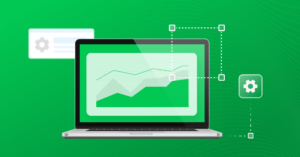Innovations like artificial intelligence (AI) and machine learning (ML) continually introduce new vulnerabilities, making DevSecOps essential. DevSecOps allows organizations to integrate security practices into the DevOps lifecycle, strengthening continuous integration, continuous deployment (CI/CD) pipelines, and balancing speed with security. Moreover, by embedding security throughout the software development lifecycle, organizations can ensure compliance, reduce risk, and respond to threats quickly.
However, implementing DevSecOps can be overwhelming when you start to consider all the different tools available.
This roundup will help you sort through some of the options by reviewing seven of the best DevSecOps tools: Datadog, Snyk, New Relic, Heroku, OpenSCAP, Wazuh, and DuploCloud. This article will evaluate each tool based on its features, ease of use, integration capabilities, pricing, and support.
Let’s get started.
Datadog
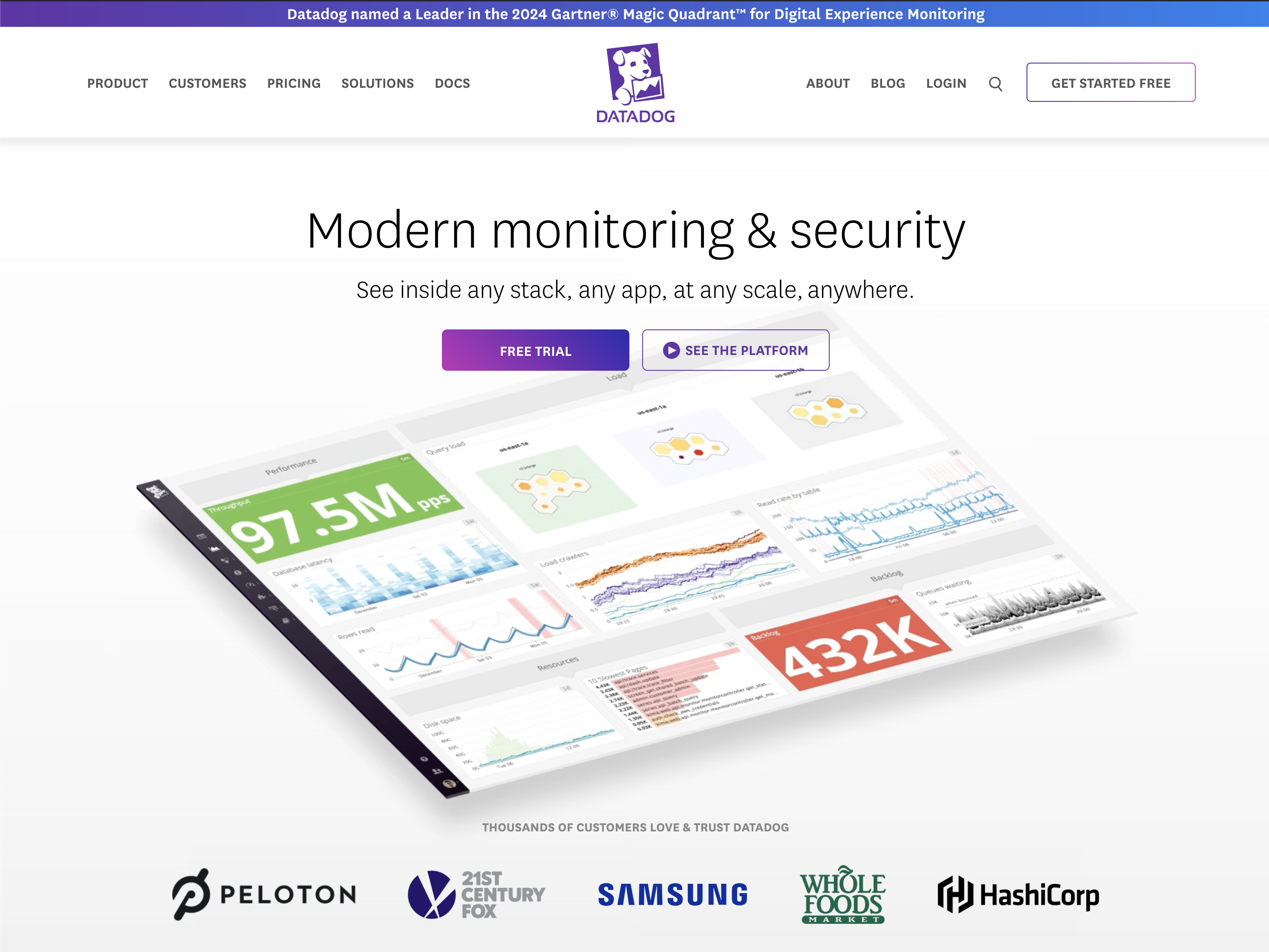
Founded in 2010, Datadog is a leading monitoring and analytics platform that has expanded to include key DevSecOps features. Recognized as a leader in the Gartner Magic Quadrant for Observability Platforms, Datadog offers a suite of tools primarily focused on observability, making it a great choice for organizations integrating observability into their security strategy.
Key Features
The security features of Datadog include Cloud SIEM, which provides real-time threat detection and investigation capabilities using the MITRE ATT&CK® framework. The platform also offers Cloud Security Posture Management (CSPM) encompassing Kubernetes Security Posture Management (KSPM) for comprehensive cloud and container security, vulnerability management for containers and hosts, cloud infrastructure entitlement management (CIEM), and compliance framework mapping to assist with audits. Advanced features, like file integrity monitoring and cloud workload security, significantly bolster the security posture of Datadog by monitoring for unauthorized changes to files and ensuring the protection of cloud workloads against potential threats.
For teams looking to bolster their DevSecOps capabilities, Datadog provides additional security add-ons like Application Security Management (ASM) for runtime protection and visibility into application-layer attacks and software composition analysis (SCA) for identifying and mitigating vulnerabilities in open source dependencies—a critical aspect of modern application security.
For those seeking to shift security even further left, the interactive application security testing (IAST) add-on integrates seamlessly into the development process, providing continuous security testing during application runtime.
Ease of Use
Platform engineers appreciate the intuitive interface of Datadog, which offers a centralized view of security alerts and compliance status. While some security teams may find the initial setup straightforward, the platform’s extensive feature set can be challenging to fully grasp. For instance, configuring advanced security rules or setting up custom correlation alerts in the Cloud SIEM may take some time to master, especially for teams new to SIEM concepts. This is due to the complexity of crafting precise rule logic and understanding the intricate data relationships required for effective threat detection.
Integration with Other Tools
Datadog integrates with Kubernetes and supports over 800 built-in integrations. For CI/CD pipelines, it offers built-in integrations with Jenkins, GitLab, and CircleCI.
Security teams can benefit from integrations with Snyk for vulnerability management, HashiCorp Vault for secrets management, and Amazon GuardDuty for threat detection. These integrations allow for comprehensive security monitoring throughout the development and deployment process.
Pricing
Datadog offers two DevSecOps plans—Pro and Enterprise, starting at $22 USD and $34 USD per host per month, respectively.
The DevSecOps Pro plan includes security features like CSPM, KSPM, and basic vulnerability management. The DevSecOps Enterprise plan builds on the former, adding file integrity monitoring and cloud workload security. For a comprehensive DevSecOps strategy, Datadog provides additional security add-ons, such as ASM, SCA, and IAST, each available as separate add-on licenses.
Support and Documentation
Datadog provides detailed documentation, including guides and API references. Other resources include its blog, knowledge center, events, and webinars, as well as live and on-demand learning sessions.
Community support is available through forums and their extensive knowledge base. Enterprise-level support, including 24/7 Slack dedicated channel and email assistance, is offered in the Pro and Enterprise tier.
New Relic
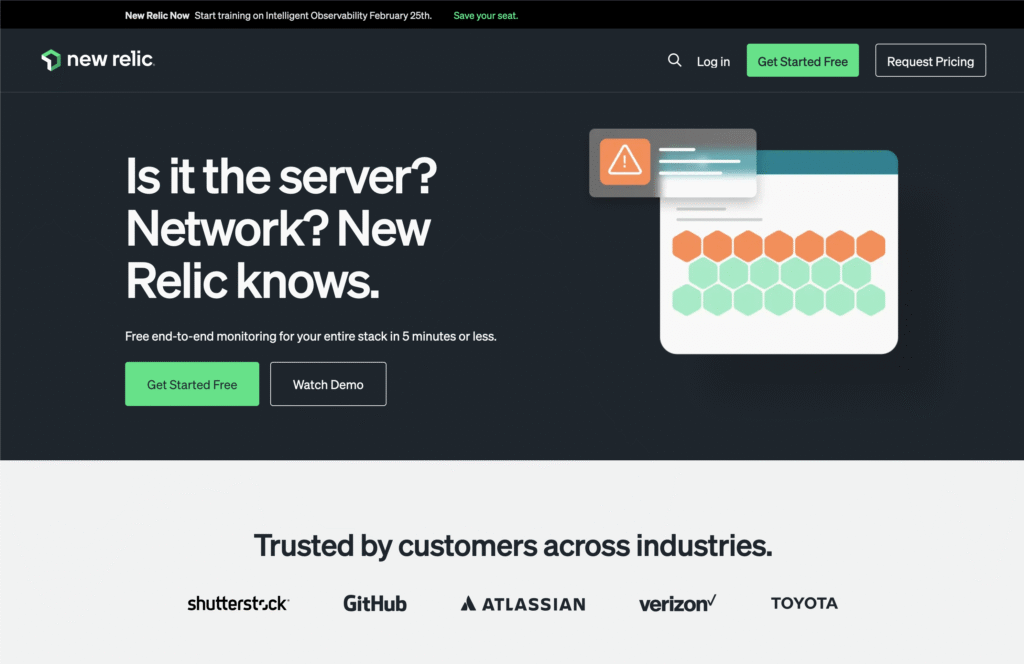
Founded in 2008, New Relic is Datadog’s most direct competitor in the observability market and is also recognized as a leader in the Gartner Magic Quadrant for Observability Platforms.
Initially focused on application performance monitoring (APM) and observability, New Relic has expanded its services to include security features, reflecting the growing intersection of observability and security in modern DevOps practices. However, New Relic focuses more on Artificial Intelligence for IT Operations (AIOps) features to help you automate and enhance IT operations.
Key Features
The security features of New Relic include the following:
- Vulnerability management to help your team identify, prioritize, and remediate the most urgent vulnerabilities
- IAST, which provides 360 visibility and context-driven insights for your code
- AI-powered anomaly detection for proactive alerting, incident detection, correlation, and resolution.
Additionally, the New Relic distributed tracing and error-tracking capabilities help pinpoint and resolve security vulnerabilities efficiently.
Ease of Use
Like Datadog, New Relic offers a user-friendly web-based interface with prebuilt dashboards and alerts that you can customize, enabling rapid deployment of security monitoring into your CI/CD pipelines.
Integration with Other Tools
New Relic offers over 780 integrations, including popular CI/CD tools, allowing for automated security checks throughout the development pipeline. It also supports Kubernetes environments, offering detailed monitoring and security insights for containerized applications. The platform’s API and SDK also enable custom integrations, allowing security teams to connect their entire toolchain for comprehensive security analysis.
Pricing
New Relic offers a perpetual free tier with 100 GB of data ingestion per month. Paid plans are based on data ingestion usage, starting at $0.35 USD per GB and going up to $0.55 USD per GB, depending on the data retention policy and compliance features. For more information on New Relic pricing, check out their documentation.
Support and Documentation
New Relic provides detailed documentation, blog posts, tutorials, and other learning resources. The New Relic University also offers free online courses to enhance skills in observability and security monitoring.
Community support is available through forums and user groups. Enterprise-level support varies from a two-business-day response SLA to a two-hour critical support response SLA depending on the tier.
Snyk
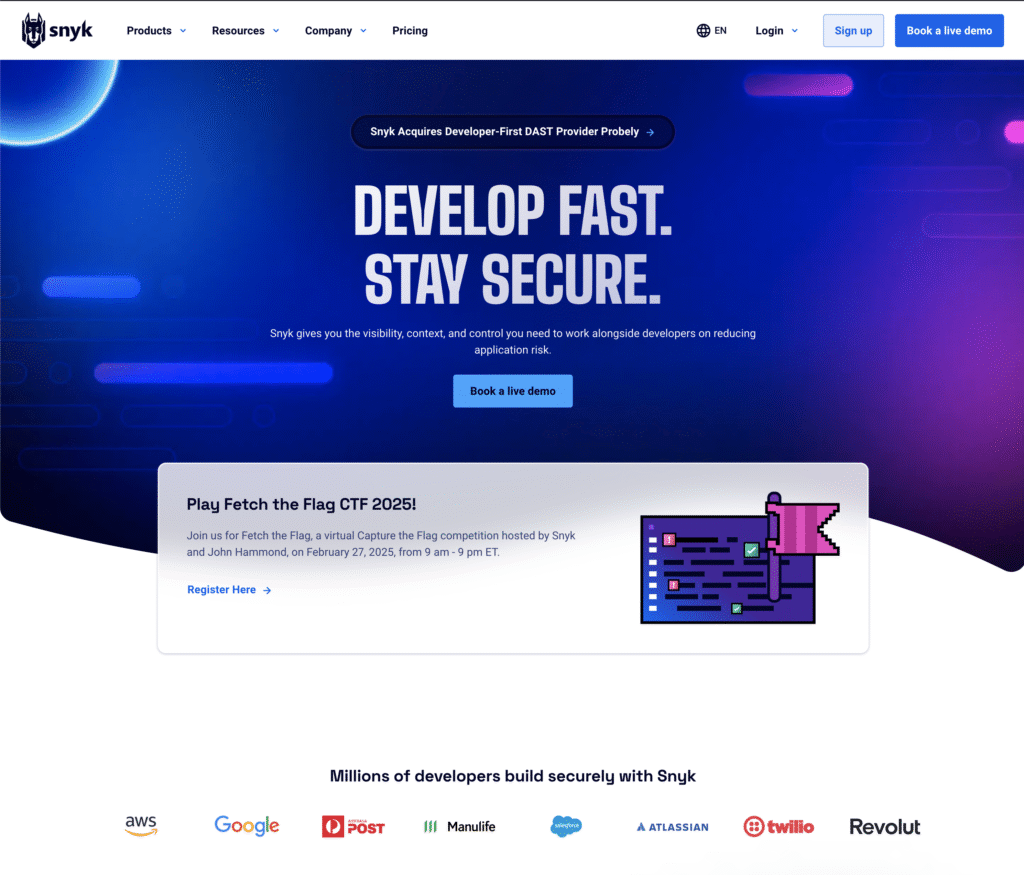
Snyk, launched in 2015, is a developer-first security platform that helps organizations find and fix vulnerabilities across their entire development lifecycle. Its approach integrates security directly into the development process, helping teams address issues early and continuously. The Snyk platform covers application security, container security, and IaC security, making it a great addition to your DevSecOps toolbox.
Key Features
The core features of Snyk include automated vulnerability scanning for open source dependencies, container images, and IaC. It offers real-time static application security testing and prioritized fix recommendations based on exploit maturity and reachability.
The Snyk Security Intelligence, powered by its comprehensive vulnerability database, provides actionable insights and remediation advice. The platform’s DeepCode AI enhances code analysis, detecting complex vulnerabilities and suggesting fixes. Meanwhile, Snyk AppRisk adds runtime protection, providing visibility into application behavior and potential threats in production environments.
Ease of Use
Snyk is easy to set up, with quick integration into existing development workflows. Its GitHub integration allows for immediate scanning of repositories, while IDE plugins help developers catch vulnerabilities as they code.
Using advanced features like custom rules and policy management may require users to familiarize themselves with rule syntax as well as adjust configurations to align with specific organizational security policies.
Integration with Other Tools
Snyk integrates with popular development tools and platforms and supports a wide range of IDEs, including Visual Studio Code, IntelliJ IDEA, and Eclipse IDE.
For CI/CD pipelines, Snyk offers built-in integrations with Jenkins, CircleCI, GitHub Actions, and more. It also integrates with container registries like Docker Hub and Kubernetes environments for continuous container security. Moreover, the Snyk API allows for custom integrations, enabling teams to incorporate security checks into their unique workflows and toolchains.
Pricing
Snyk offers a free tier for small teams and open-source projects. This tier provides basic vulnerability scanning and suggestions for fixes.
Paid plans start with the Team plan at $25 USD per month per product, which includes more advanced features, like license compliance, Jira integration, and priority support. The Enterprise plan offers additional capabilities, such as Rich API, advanced reporting, custom user roles, security policy management, application asset discovery, and risk-based prioritization using Snyk AppRisk. Pricing is based on the number of developers and tested projects.
Support and Documentation
Snyk has extensive documentation, events, webinars, and a resource library that includes user guides, API references, and best practices. Additionally, the Snyk Learn platform offers free educational resources on various security topics.
Community support is available through public forums and the Snyk blog. Premium support, including dedicated account management and 24/7 support, is available for Enterprise customers.
OpenSCAP

OpenSCAP is an open source security compliance and vulnerability scanning tool that implements the Security Content Automation Protocol (SCAP) standards developed by NIST. Initiated by Red Hat in 2008, OpenSCAP is known for its ability to perform automated compliance checks against various security policies and standards).
Key Features
At its core, OpenSCAP excels in vulnerability assessment, using Open Vulnerability and Assessment Language (OVAL) definitions to meticulously scan systems for known vulnerabilities. This capability is complemented by its robust compliance-checking feature, which evaluates system configurations against SCAP-expressed security policies, ensuring adherence to industry standards.
For teams looking to address identified issues quickly, OpenSCAP provides a remediation function that generates fix scripts for automatic issue resolution. The tool also lets users customize security policies using various SCAP components, like the Extensible Configuration Checklist Description Format (XCCDF) and OVAL. These features collectively enable security teams to implement automated security checks at multiple stages of their CI/CD pipeline, fostering continuous compliance and proactive vulnerability management throughout the development lifecycle.
Ease of Use
If you’re new to SCAP standards, the OpenSCAP CLI can be overwhelming, especially when compared to web-based solutions like Datadog or New Relic. Fortunately, components like the SCAP Workbench provide a basic graphical interface that simplifies policy customization and scan execution.
Overall, the scriptable nature of OpenSCAP offers flexibility for defining custom security policies and integrating with CI/CD pipelines, though it may require an initial setup effort.
Integration with Other Tools
OpenSCAP integrates with Red Hat Enterprise Linux and Red Hat Satellite infrastructure management. While not inherently designed for Kubernetes, OpenSCAP can be used to scan container images in a Kubernetes cluster through the oscap-docker command.
Beyond the Red Hat ecosystem, OpenSCAP can be integrated into CI/CD pipelines through Jenkins plugins for automated scanning and used for Docker container scanning in workflows. It also integrates with open source configuration management tools like Ansible, allowing you to create custom remediation playbooks and streamline compliance automation routines.
Pricing
OpenSCAP is free and open source software available under the GNU General Public License. There are no direct costs associated with using the tool itself. However, organizations should consider the potential costs of training, implementation, and maintenance.
Support and Documentation
OpenSCAP provides an extensive user manual and additional resources, including user guides, tutorials, FAQ, security guides, and API documentation. Community support is available through mailing lists, StackExchange, IRC, and GitHub issues. While there’s no official commercial support for the open source version, enterprise support is available through Red Hat for their OpenSCAP-based products.
Wazuh
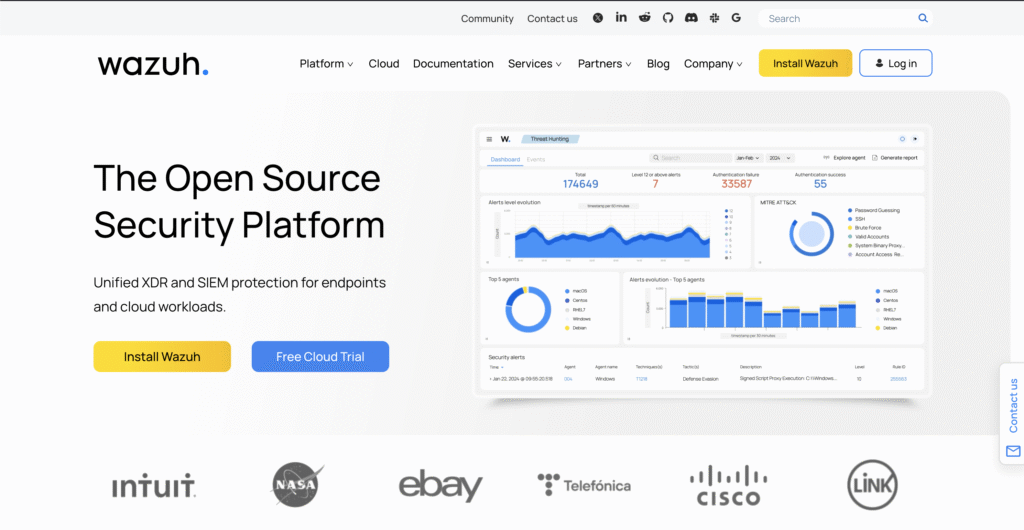
Wazuh was launched in 2015 and is an open source security platform that offers unified extended detection and response (XDR) and SIEM capabilities that protect endpoints and cloud workloads. Evolving from its OSSEC roots, Wazuh has become a complete security solution that combines threat intelligence, endpoint security, and compliance management.
For security teams, Wazuh provides a framework to enhance security throughout the CI/CD pipeline.
Key Features
The Wazuh threat intelligence uses rule-based analysis and MITRE ATT&CK mapping to identify security incidents across your infrastructure. For CI/CD pipelines, Wazuh provides real-time file integrity monitoring to detect unauthorized changes in critical files and system binaries, ensuring the integrity of your codebase and deployment artifacts.
Wazuh also offers vulnerability detection for both hosts and containers, a crucial feature for identifying weaknesses before deployment. Security configuration assessment for cloud platforms helps ensure your infrastructure adheres to best practices throughout the development and deployment process.
Additionally, the Wazuh automated security responses help teams quickly address detected threats without manual intervention. The platform also provides regulatory compliance support for standards like the PCI DSS, General Data Protection Regulation (GDPR), and HIPAA.
Ease of Use
Wazuh caters to various technical expertise levels. Its web-based UI provides intuitive navigation and customizable dashboards. For more advanced users, Wazuh offers an API and command line tools for deeper integration and customization. Keep in mind that fully using all of the Wazuh capabilities may require a learning curve, particularly for teams new to SIEM and XDR concepts.
Integration with Other Tools
Unlike other tools in this roundup, Wazuh doesn’t require direct integration with CI/CD pipelines in the traditional sense. Instead, it uses an agent-server model that can be used to enhance security throughout the DevOps lifecycle, including CI/CD processes. Security teams can integrate Wazuh into their practices by installing agents on relevant servers, configuring log monitoring from various sources in the CI/CD pipeline, and then use Wazuh API for security checks.
Kubernetes integration enables security monitoring for containerized environments and is crucial for modern microservices architectures. Wazuh connects with cloud platforms, such as AWS, Microsoft Azure, and Google Cloud, providing comprehensive security coverage for hybrid and multicloud deployments. Wazuh also integrates well with Elasticsearch, OpenSearch, Splunk, and Amazon Security Lake.
Pricing
Just like OpenSCAP, Wazuh is open source and free, with no licensing costs. For organizations requiring additional support or managed services, Wazuh offers commercial options, with pricing based on the number of agents and level of support needed.
Support and Documentation
Wazuh has intuitive documentation, public and private training courses, and a blog. Community support is available through the Wazuh mailing list, Slack channel, Reddit, Discord, and social media. As mentioned, commercial support is available upon request.
Heroku
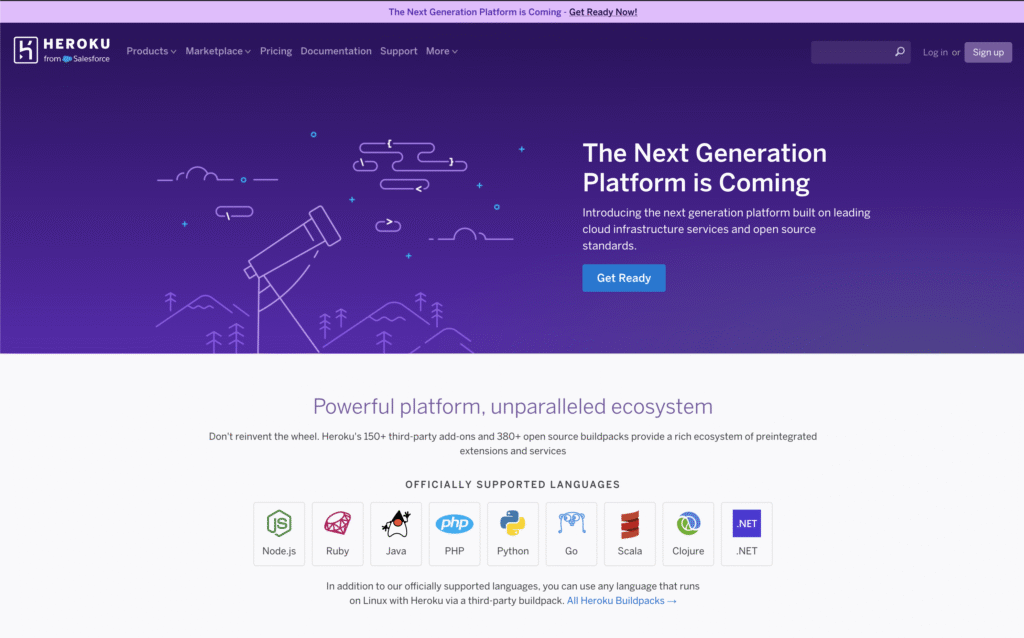
Heroku was founded in 2007 and acquired by Salesforce in 2010. It is a cloud platform as a service (PaaS) that enables developers to build, run, and scale applications. While not primarily a DevSecOps tool, Heroku offers features and integrations that can enhance security within CI/CD pipelines, making it relevant for organizations looking to streamline their development and deployment processes securely.
Key Features
Heroku Flow integrates with GitHub to facilitate continuous delivery by automating app builds and tests. This integration is enhanced by Review Apps, which deploys GitHub pull request code in a complete, disposable Heroku app, enabling comprehensive security checks before merging.
Additionally, Heroku CI executes your test suite in clean, isolated environments with each code push, ensuring the development process does not introduce security vulnerabilities. For enterprise-grade applications, Heroku Shield offers advanced security controls to meet HIPAA or PCI DSS compliance requirements in regulated industries.
Ease of Use
Heroku simplifies the deployment process with its Git-based workflow, allowing developers to focus on code rather than infrastructure management. The platform’s intuitive dashboard and CLI give you easy access to logs, metrics, and app management.
For security teams, the Heroku Flow pipeline feature offers a visual interface to manage the flow of code from development to production, enhancing visibility and control over the security aspects of the deployment process.
Integration with Other Tools
The Heroku Elements Marketplace provides a wide range of add-ons, buttons, and buildpacks for monitoring, logging, and security. This allows your team to support source control and CI/CD workflows, enabling automated security checks at every code commit. For instance, you can integrate Snyk for vulnerability scanning or New Relic or Datadog for APM, anomaly detection, and log management. All in all, these integrations, along with the Heroku API, enable custom integrations with external tools and services.
Pricing
Heroku offers paid plans from $5 USD and up per month per dyno (Linux container). Similar to other cloud providers, Heroku offers different resource configurations ranging from one compute unit and 512 Mb of RAM to 100 compute units and 126 GB of RAM.
Support and Documentation
Heroku has extensive documentation, including guides, best practices, and API references. The Heroku Dev Center also offers numerous resources for developers, including podcasts.
Community support is available through forums and Stack Overflow. Premium support is available for Enterprise customers via email, a dedicated phone number for emergencies, and online tickets. SLA response depends on your plan.
DuploCloud
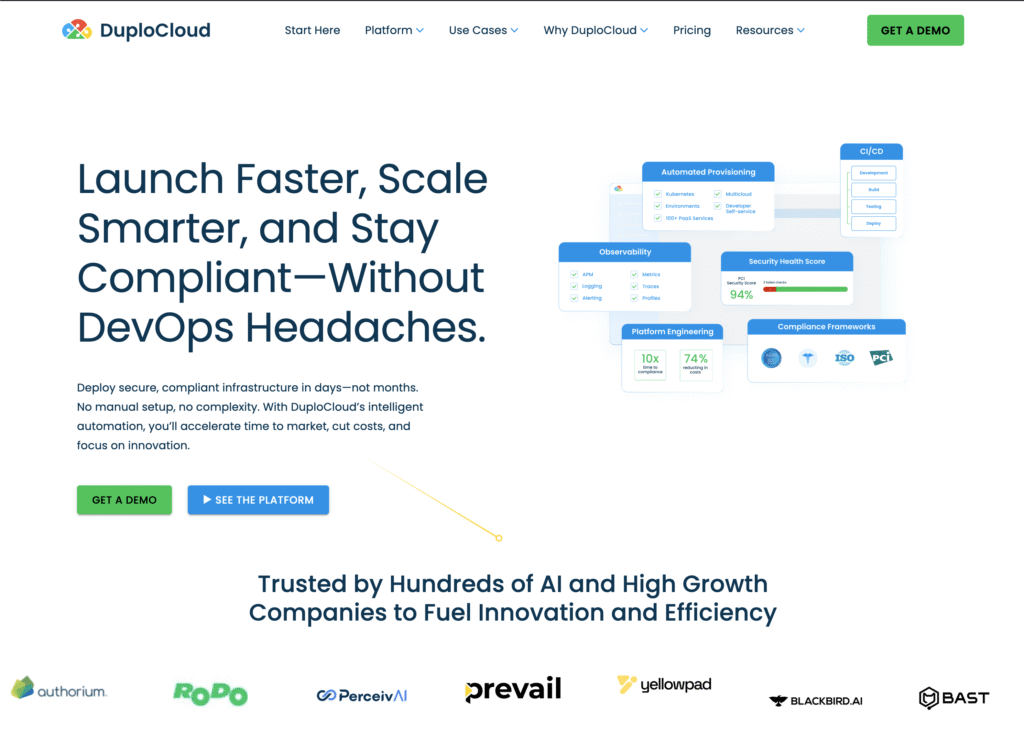
DuploCloud is a DevOps automation platform designed to simplify cloud infrastructure management, security, and compliance. Tailored for start-ups and high growth companies, DuploCloud integrates infrastructure provisioning, security controls, and compliance management into a single, user-friendly interface. This all-in-one approach aims to help security teams implement robust DevSecOps practices without the need for a dedicated DevSecOps team.
Key Features
The key features of DuploCloud are as follows:
- Automated infrastructure provisioning with built-in security and compliance controls
- Out-of-the-box compliance monitoring across major cloud providers—Amazon Web Services (AWS), Microsoft Azure, and Google Cloud.
- Full observability suite for enhanced visibility and insights
DuploCloud offers CI/CD services, helping your team build, test, and deploy applications from commits and pull requests securely.
DuploCloud also provides developer cloud self-service tools, including disaster recovery and just-in-time (JIT) access, with automatically generated least-privilege identity and access management (IAM) permissions for added security. Check out the DuploCloud Supported Feature List if you want to take a look at everything DuploCloud offers.
Ease of Use
Designed with busy engineers in mind, DuploCloud has an intuitive no-code/low-code app-focused interface and command line interface (CLI) that simplifies complex DevOps tasks, like infrastructure provisioning, service scaling, JIT access, compliance, security, and alerting. This simplified approach requires minimal setup compared with other DevSecOps implementations.
Overall, the DuploCloud approach means that even developers without extensive DevSecOps backgrounds can quickly implement and manage secure CI/CD pipelines, freeing up time to focus on core business objectives.
Integration with Other Tools
Beyond integrating with major cloud providers, DuploCloud also supports popular DevOps tools and CI/CD pipelines, like Jenkins, GitLab, and CircleCI, facilitating seamless integration into existing development workflows.
DuploCloud also integrates third-party tools), like the Wazuh security information and event management (SIEM) solution, ClamAV antivirus, New Relic alerting, Prometheus/Grafana metrics, Elasticsearch logging, and Zed Attack Proxy (ZAP) penetration testing. This means no matter what you’re using, DuploCloud can fit into your existing workflows.
The platform also supports Kubernetes deployments via kubectl or Helm charts and provides its own Terraform provider so teams can maintain infrastructure-as-code (IaC) practices while benefiting from the DuploCloud’s security automation.
Pricing
DuploCloud operates on a monthly pricing model based on an annual subscription that includes optional add-ons and enterprise support services. The pricing tiers are designed to cater to different stages of business growth:
– DevOps plan: Priced at $3,000 USD for the first twenty-five nodes, this plan includes automation of AWS, Microsoft Azure, and Google Cloud services; application deployment for containers and serverless infrastructure; and standard diagnostics, like monitoring and logging.
– DevSecOps plan: Offered at $4,500 USD for the first fifty nodes, the plan builds on the DevOps features, with added compliance support for standards such as SOC 2, ISO 27001, and the Health Insurance Portability and Accountability Act (HIPAA). It also includes security features like SIEM solutions and vulnerability assessments.
– DevSecOps PLUS plan: This plan costs $6,500 USD for the first fifty nodes and includes all features of the DevSecOps plan, along with advanced compliance for the National Institute of Standards and Technology (NIST), Payment Card Industry Data Security Standard (PCI DSS), and HITRUST.
Additional services include advanced observability for $1,500 USD/month and penetration testing at $4,800 USD annually. DuploCloud also provides special startup pricing and optional US-only support.
Support and Documentation
DuploCloud has comprehensive documentation and support resources, including a blog, cloud provider–specific guides, detailed FAQ, white papers, ebooks, webinars, and a video library.
DuploCloud also has a dedicated DevOps team that assists with onboarding, replicating existing applications into the DuploCloud environment, and providing ongoing compliance assistance. This hands-on support can be particularly valuable for startups that don’t have extensive in-house DevOps expertise.
Final Thoughts
With so many DevSecOps tools available, you have to understand your organization’s unique security needs and team dynamics to choose the right one.
Consider Datadog or New Relic if you’re looking to blend observability with security features. For teams eager to shift security left, the Snyk developer-centric approach could be a good fit. However, Heroku might be your go-to if you need simplified deployment with built-in security; though be mindful of potential control limitations.
Are compliance and standardized security checks your primary concern? OpenSCAP could be your ally, especially in Red Hat environments, but be prepared for a steep learning curve. For those willing to invest time and resources, Wazuh offers a comprehensive open source security solution that can significantly boost your security posture.
Startups and small companies juggling multiple priorities might find the DuploCloud all-in-one DevSecOps automation particularly appealing, potentially saving significant time and resources in the long run.
Remember, there’s no one-size-fits-all solution. The key is to align your choice with your team’s expertise, industry-specific compliance requirements, and growth trajectory.


